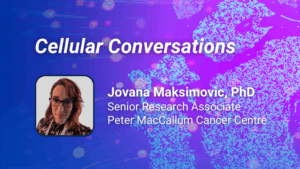Cellular Conversations with Dr Jovana Maksimovic
Join the conversation
Register to attend
Gene fusions are caused by chromosomal rearrangements such as translocations and can drive tumor initiation, progression, and resistance to therapy. It is estimated that they drive approximately 16.5% of all cancers, and are particularly prevalent in haematological malignancies.
Bulk RNA sequencing (RNA-seq) is a powerful tool for identifying fusion transcripts that can be used clinically to guide diagnosis and treatment. However, it cannot determine which cell types express gene fusions or how their expression profiles differ from other cells. Detecting fusions at the single-cell level is of growing interest, but high noise, technical artifacts, cost and throughput are limiting factors in current fusion detection approaches that require full-length transcript protocols, such as Smart-seq or long-reads.
Here, we develop a fast and cost-effective approach using the 10x Flex single-cell RNA-seq protocol to detect fusion expression at single-cell resolution. 10x Flex uses a probe-based approach to detect the expression of 18,532 protein-coding genes and allows for the design of custom probes to detect expression of features of interest. Our approach for fusion detection leverages the sensitivity of bulk RNA-seq for the design of custom probes that target the fusion transcript breakpoint allowing their detection along with the transcriptome.
We demonstrate fusion transcript detection in MCF7 cells and 11 B-ALL bone marrow samples. In MCF7, we detected 24 fusions, with 5–6 fusions per cell on average. In B-ALL, we tracked changes in P2RY8::CRLF2, NR3C1::ZSCAN26, and BRD9::NUTM1 expression between diagnosis and relapse, identifying P2RY8::CRLF2 in 4 relapse cells missed at the bulk level. We also detected ETV6::RUNX1 across multiple diagnosis, relapse, and MRD samples.
Overall, using custom probes to detect cancer fusions in a “standard” single-cell experiment offers a simple, yet powerful, strategy for studying their effects across cell types, improving our understanding of cancer heterogeneity.
Why attend?
- Gain Unique Biological Insights Learn from leading researchers as they present ground-breaking discoveries derived from their experiments using 10x Genomics’ single cell products.
- Learn from Real Experiences Our featured speakers won’t just share their scientific outcomes—they’ll provide detailed accounts of their personal journeys with single-cell experiments. Gain practical knowledge on navigating the challenges and triumphing over the hurdles of single-cell research.
- Valuable Lessons and Advice Imagine receiving advice from someone who has been in your shoes. Whether you’re planning your first single-cell experiment or looking to refine your techniques, the experiences and lessons shared by our speakers will equip you with the knowledge to succeed in your own research.
- Interactive Q&A and Discussions Engage directly with experts. Each session includes a dedicated Q&A segment where you can ask specific questions, discuss methodologies, and gain deeper insights into single-cell experimentations. This is your opportunity to clarify doubts and learn directly from the pioneers in the field.